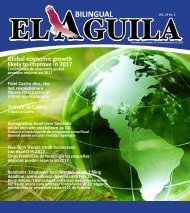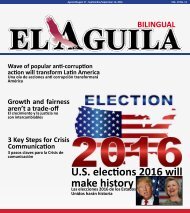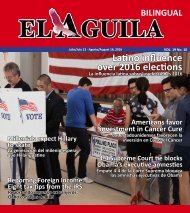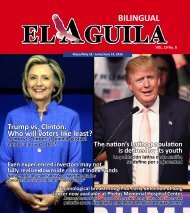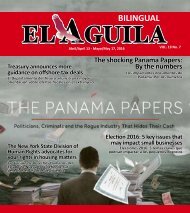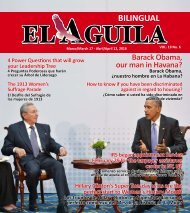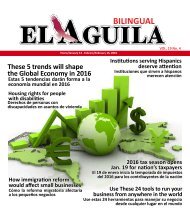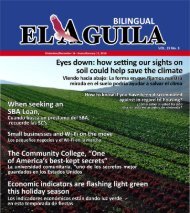El Aguila Magazine – November 16, 2016
You also want an ePaper? Increase the reach of your titles
YUMPU automatically turns print PDFs into web optimized ePapers that Google loves.
<strong>El</strong> <strong>Aguila</strong> Noviembre/<strong>November</strong> <strong>16</strong> - Diciembre/December 13, 20<strong>16</strong><br />
IMPUESTOS Y FINANZAS/TAX & FINANCE<br />
13<br />
Recordatorio: Empleadores enfrentan nueva fecha límite del 31 de enero para entregar<br />
formularios W-2s; algunos reembolsos se retendrán hasta el 15 de febrero<br />
WASHINGTON — <strong>El</strong><br />
Servicio de Impuestos<br />
Internos (IRS) recordó<br />
a los empleadores y pequeños<br />
negocios del nuevo plazo del 31<br />
de enero para la presentación de<br />
formularios W-2. <strong>El</strong> IRS también<br />
debe retener algunos reembolsos<br />
hasta el 15 de febrero.<br />
Una nueva ley federal, orientada<br />
a facilitarle al IRS la detección y<br />
prevención del fraude de reembolsos,<br />
acelerará al 31 de enero<br />
el plazo de presentación de formularios<br />
W-2s para los empleadores.<br />
Por razones similares, la<br />
nueva ley también requiere que<br />
el IRS retenga los reembolsos<br />
de dos importantes créditos tri-<br />
WASHINGTON — The<br />
Internal Revenue Service<br />
today reminded<br />
employers and small businesses<br />
of a new Jan. 31 filing deadline<br />
for Forms W-2. The IRS must<br />
also hold some refunds until<br />
Feb. 15.<br />
A new federal law, aimed at<br />
making it easier for the IRS to<br />
detect and prevent refund fraud,<br />
will accelerate the W-2 filing<br />
deadline for employers to Jan.<br />
31. For similar reasons, the<br />
new law also requires the IRS<br />
to hold refunds involving two<br />
key refundable tax credits until<br />
at least Feb. 15. Here are details<br />
on each of these key dates.<br />
New Jan. 31 Deadline for Employers<br />
The Protecting Americans from<br />
Tax Hikes (PATH) Act, enacted<br />
last December, includes a<br />
new requirement for employers.<br />
They are now required to file<br />
their copies of Form W-2, submitted<br />
to the Social Security<br />
Administration, by Jan. 31.<br />
The new Jan. 31 filing deadline<br />
also applies to certain Forms<br />
1099-MISC reporting non-employee<br />
compensation such as<br />
payments to independent contractors.<br />
butarios reembolsables, hasta<br />
por lo menos el 15 de febrero. A<br />
continuación se incluyen los detalles<br />
de cada una de estas fechas<br />
claves.<br />
Nueva fecha límite del 31 de<br />
enero para los empleadores<br />
La Ley de Protección contra Alzas<br />
de Impuestos a los Americanos<br />
(PATH, por sus siglas en<br />
inglés) de 2015, aprobada por el<br />
Congreso y promulgada el pasado<br />
mes de diciembre, incluye un<br />
nuevo requisito para los empleadores.<br />
Ahora se les requiere entregar<br />
sus copias del Formulario<br />
W-2 a la Administración del Seguro<br />
Social, para el 31 de enero.<br />
Reminder: Employers face new Jan. 31 W-2 filing<br />
deadline: Some refunds delayed until Feb. 15<br />
In the past, employers typically<br />
had until the end of February,<br />
if filing on paper, or the end of<br />
March, if filing electronically,<br />
to submit their copies of these<br />
forms. In addition, there are changes<br />
in requesting an extension to<br />
file the Form W-2. Only one 30-<br />
day extension to file Form W-2<br />
is available and this extension is<br />
not automatic. If an extension is<br />
necessary, a Form 8809 Application<br />
for Extension of Time to<br />
File Information Returns must be<br />
completed as soon as you know<br />
an extension is necessary, but by<br />
January 31. Please carefully review<br />
the instructions for Form<br />
8809, for more information.<br />
“As tax season approaches, the<br />
IRS wants to be sure employers,<br />
especially smaller businesses,<br />
are aware of these new deadlines,”<br />
said IRS Commissioner<br />
John Koskinen. “We are working<br />
with the payroll community and<br />
other partners to share this information<br />
widely.”<br />
The new accelerated deadline<br />
will help the IRS improve its<br />
efforts to spot errors on returns<br />
filed by taxpayers. Having these<br />
W-2s and 1099s earlier will make<br />
it easier for the IRS to verify the<br />
legitimacy of tax returns and properly<br />
issue refunds to taxpayers<br />
eligible to receive them. In many<br />
instances, this will enable the<br />
<strong>El</strong> nuevo plazo de presentación<br />
del 31 de enero también aplica a<br />
ciertos formularios 1099-MISC<br />
Informe de pagos misceláneos a<br />
contratistas independientes.<br />
En el pasado,, los empleadores típicamente<br />
tenían hasta finales de<br />
febrero, si presentaban una declaración<br />
en papel, o finales de marzo,<br />
si presentaban una declaración<br />
electrónicamente, para enviar sus<br />
copias de estos formularios. Además,<br />
hay cambios al proceso de<br />
solicitar una prórroga para presentar<br />
el formulario W-2. Sólo está<br />
disponible una prórroga de 30 días<br />
para presentar el formulario W-2<br />
y esta extensión no es automática.<br />
IRS to release tax refunds more<br />
quickly than in the past.<br />
The Jan. 31 deadline has long<br />
applied to employers furnishing<br />
copies of these forms to their employees<br />
and that date remains unchanged.<br />
Some Refunds Delayed Until at<br />
Least Feb. 15<br />
Due to the PATH Act change,<br />
some people will get their refunds<br />
a little later. The new law requires<br />
the IRS to hold the refund for<br />
any tax return claiming either the<br />
Earned Income Tax Credit (EITC)<br />
or Additional Child Tax Credit<br />
(ACTC) until Feb. 15. By law, the<br />
IRS must hold the entire refund,<br />
not just the portion related to the<br />
EITC or ACTC.<br />
Even with this change, taxpayers<br />
should file their returns as they<br />
normally do. Whether or not claiming<br />
the EITC or ACTC, the IRS<br />
cautions taxpayers not to count on<br />
getting a refund by a certain date,<br />
especially when making major<br />
purchases or paying other financial<br />
obligations. Though the IRS<br />
issues more than nine out 10 refunds<br />
in less than 21 days, some<br />
returns are held for further review.<br />
Source: irs.gov<br />
Si una extensión es necesaria, debe<br />
completarse un formulario 8809<br />
Solicitud de prórroga para presentar<br />
declaraciones de información,<br />
tan pronto como usted se entere<br />
que necesitará una extensión, pero<br />
para el 31 de enero. Para más información,<br />
por favor revise cuidadosamente<br />
las instrucciones del<br />
formulario 8809.<br />
“Al acercarse la temporada de impuestos,<br />
el IRS quiere asegurarse<br />
que los empleadores, especialmente<br />
pequeñas empresas, están conscientes<br />
de estos nuevos plazos,”<br />
dijo John Koskinen, Comisionado<br />
del IRS. “Actualmente, trabajamos<br />
con la comunidad de nómina<br />
y otros socios para compartir esta<br />
información ampliamente.<br />
<strong>El</strong> nuevo plazo acelerado contribuirá<br />
para que el IRS mejore sus<br />
esfuerzos para detectar errores en<br />
las declaraciones presentadas por<br />
los contribuyentes. Contar más<br />
temprano con estos formularios<br />
W-2s y 1099s, le facilitará al IRS<br />
verificar la legitimidad de las declaraciones<br />
de impuestos y emitir<br />
correctamente reembolsos a los<br />
contribuyentes elegibles.<br />
En muchos casos, esto permitirá al<br />
IRS emitir los reembolsos de impuestos<br />
más rápido que en el pasado.<br />
<strong>El</strong> 31 de enero ha sido la fecha límite<br />
durante mucho tiempo para<br />
que los empleadores entreguen<br />
copias de estas formas a sus empleados<br />
y esa fecha no ha cambiado.<br />
Algunos reembolsos se retendrán<br />
hasta al menos el 15 de<br />
febrero.<br />
Debido al cambio de la Ley<br />
PATH, algunos contribuyentes<br />
recibirán sus reembolsos más<br />
adelante. La nueva ley requiere<br />
que el IRS retenga el reembolso<br />
de cualquier declaración que<br />
reclame el crédito tributario por<br />
niño adicional (ACTC) o el crédito<br />
tributario por ingreso del trabajo<br />
(EITC) hasta el 15 de febrero.<br />
Por ley, el IRS debe retener el<br />
reembolso completo, no sólo la<br />
parte relacionada con estos créditos<br />
del EITC o ACTC.<br />
Incluso con este cambio, los contribuyentes<br />
deberán presentar<br />
sus declaraciones como normalmente<br />
lo harían. Ya sea que reclamen<br />
el EITC o ACTC, el IRS<br />
advierte a los contribuyentes que<br />
no cuenten con obtener un reembolso<br />
en una fecha determinada,<br />
sobre todo al hacer grandes compras<br />
o pagar otras obligaciones<br />
financieras. Aunque el IRS emite<br />
más de nueve a 10 reembolsos en<br />
menos de 21 días, algunos reembolso<br />
se retendrán para revisión<br />
adicional.<br />
Fuente: irs.gov




